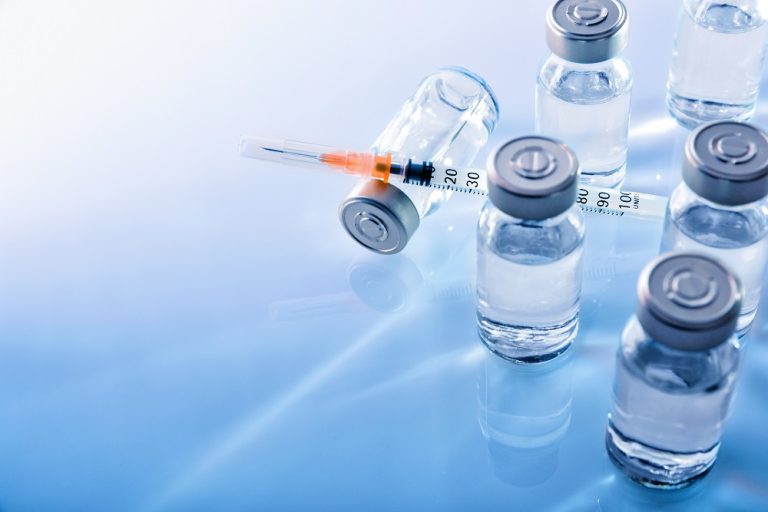Health stakeholders and public health advocates have called for the immediate release of vaccine funds and increased budgetary allocation in line with Nigeria’s increasing population.
The stakeholders also called for decisive action toward local vaccine production as the country seeks to strengthen its immunisation systems and health security.
They made the call at a high-level immunisation financing press conference on Monday in Abuja.
The conference, with the theme “Future of Immunisation Financing: Leaving No One Behind” was organised by the Vaccine Network for Disease Control (VNDC) in collaboration with the Global Health Advocacy Incubator (GHAI).
The stakeholders decried the inadequacy and unpredictability of funding for vaccines, emphasising that the health and survival of Nigeria’s children were at stake.
According to Ibrahim Oloriegbe, Chairman, National Health Insurance Authority (NHIA), vaccine funding must be like sunlight; available when needed.
Oloriegbe, who is also the former Chairman, Senate Committee on Health, painted a detailed picture of the vaccine delivery pipeline from national procurement to donor involvement, state-level distribution, and local government health facilities.
He said that although states and LGAs were expected to take up last-mile logistics, many gaps remained.
Oloriegbe stressed the need for predictable vaccine funding, adding that a child born today cannot wait for the next quarter’s capital release.
“The cold chain is a critical part of that entire chain. Without proper storage and temperature control, vaccines lose their efficacy.
“That’s where civil society and partners step in, but ideally, this should be a government-led process,” he said.
“Vaccine financing must be available like sunlight; reliable, consistent, and timely,” he said.
A former Member of the House of Representatives, Hon. Mohammed Usman said that funding was inadequate and should be increased as the population grew.
Usman expressed deep frustration over delayed releases.
“It is April, but money for 2024 vaccines has still not been released. That is very sad.
“Are we serious? With Nigeria’s population now over 230 million and growing daily, funding for vaccines must increase accordingly,” he said.
He also called on President Bola Ahmed Tinubu to match his Renewed Hope Agenda with action.
“Timely release of funds for vaccines must be emphasis9ed.
“The President must lead by example. The health minister Prof. Muhammad Ali Pate, given his deep understanding of community health needs, is well-placed to drive this change,” he said.
He advocated for stronger involvement of local governments, especially as Nigeria moves toward financial autonomy at the grassroots level.
According to him, federal, state, and local governments all have roles to play.
He called for resurrection of Nigeria’s vaccine production capacity, noting that the country once produced its vaccines in the 1970s.
“And local governments must show that they are ready to fulfill their responsibilities,” he said.
Usman said that the country needed N50 billion to N100 billion for vaccine production.
VNDC’s Executive Director, Mrs Chika Offor reflected on the progress made in vaccine financing over the past year, highlighting a breakthrough in December, 2024.
“In December 2023, the future of vaccine financing in Nigeria looked uncertain.
“Despite continuous advocacy through the Partnership to Reach Zero-Dose Children (PREACH) initiative, the 2022 and 2023 vaccine funds remained unreleased.
“However, by December 2024, there was a breakthrough. The Federal Government released the outstanding funds and allocated 25 per cent of the 2024 vaccine budget,” Offor said.
She commended President Bola Ahmed Tinubu, Prof Pate, and Minister of Finance, Mr Wale Edun for their commitment to prioritising immunisation and securing funds for vaccines.
“The 2025 budget’s allocation of N231.7 billion for immunisation, malaria vaccination, and vaccine tracking is a significant milestone toward universal vaccine coverage,” she noted.
However, she warned that the sustainability of these gains is now at risk, adding that with the exit of USAID funding and diminishing donor support, Nigeria’s vaccine financing is more vulnerable than ever.
“Shrinking fiscal space and competing national priorities further threaten immunisation programmes.
“If we do not act swiftly, we risk reversing the progress made in 2024.
“This is a call for urgent and coordinated action from all stakeholders.
“We urge President Bola Tinubu to direct the Ministry of Budget and National Planning to establish a predictable and sustainable immunisation financing framework.
“Vaccine financing is not just a health priority, it is a smart economic investment that saves lives and reduces healthcare costs,” Offor said.
Co-Convener Joint Learning Agenda for UHC in Nigeria lauded the stakeholders for their unwavering commitment to protecting Nigeria’s children through strengthened immunization systems.
According to the World Health Organisation, immunisation remains a mainstay in safeguarding children’s health worldwide.
However, achieving universal vaccination coverage has been a significant global challenge.
In lower and middle-income countries, more than 12.4 million children did not receive any vaccine in 2020.
These vulnerable children, known as “zero-dose children” account for a substantial portion of preventable deaths in children.
Nigeria faces a particularly alarming situation among these countries, with over 2.2 million estimated zero-dose children in 2021.
To address this pressing issue, the signatory agencies of the Global Action Plan for Healthy Lives and Well-being for All (SDG3 GAP) are collaborating with the Nigerian government to reach every child with immunisation services.
Through their joint efforts, SDG3 GAP partners embrace a collaborative approach as the most effective path toward achieving this critical goal.
NAN


